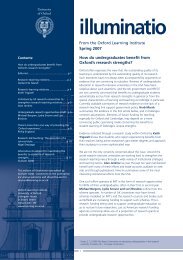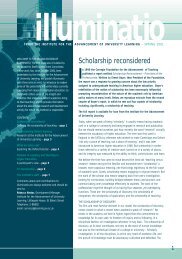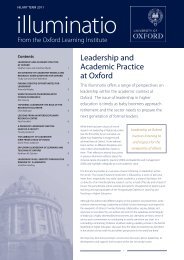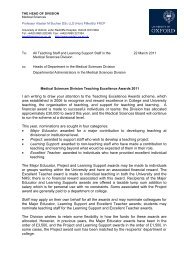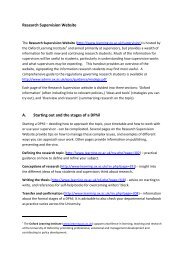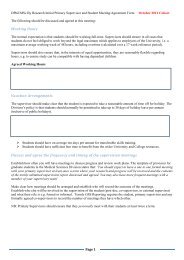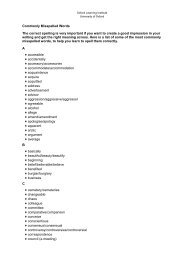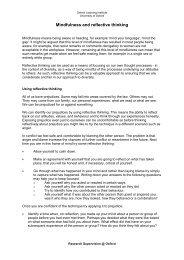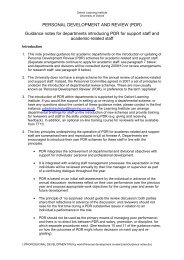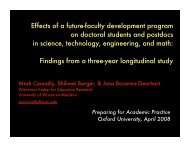Developing the whole student - Oxford Learning Institute - University ...
Developing the whole student - Oxford Learning Institute - University ...
Developing the whole student - Oxford Learning Institute - University ...
Create successful ePaper yourself
Turn your PDF publications into a flip-book with our unique Google optimized e-Paper software.
Stimulus paper by Kathleen M. Quinlan 02<br />
Executive Summary<br />
1<br />
Palmer et al (2010)<br />
In addition to influencing <strong>student</strong>s’ knowledge base, thinking abilities and skills, higher<br />
education offers <strong>the</strong> opportunity to promote o<strong>the</strong>r aspects of <strong>student</strong>s’ growth as people.<br />
Higher education has an important role in shaping our future society because today’s<br />
university <strong>student</strong>s will be tomorrow’s doctors, engineers, business managers, teachers,<br />
faith leaders, politicians, citizens, activists, parents and neighbours. While <strong>the</strong>y need to<br />
be able to demonstrate key skills and knowledge to enact those roles effectively, <strong>the</strong>y<br />
must also demonstrate personal and social responsibility in carrying <strong>the</strong>m out. A focus<br />
on holistic <strong>student</strong> development may be particularly timely in addressing <strong>the</strong> current<br />
challenges <strong>the</strong> sector, and society, faces.<br />
While much of <strong>the</strong> current political discourse about higher education is instrumental<br />
and economic, this paper aims to lay <strong>the</strong> foundation for a discourse focused on <strong>student</strong><br />
development. It puts forward a conceptual framework for leadership of learning and<br />
teaching in higher education, assuming we need to contextualise leadership, by focusing<br />
specifically on leadership of something for something. In this case, <strong>the</strong> argument is for<br />
leadership of teaching and learning for <strong>the</strong> purpose of promoting <strong>student</strong>s’ holistic<br />
development. To support leaders’ understanding of <strong>the</strong> key issues in holistic <strong>student</strong><br />
development and <strong>the</strong> leadership implications of embracing such an educational purpose,<br />
<strong>the</strong> paper syn<strong>the</strong>sises literature from a variety of spheres that answers five key questions.<br />
A brief summary of responses to each question is provided here.<br />
What is meant by ‘developing <strong>the</strong> <strong>whole</strong> <strong>student</strong>’ and how might this<br />
general aim fit within <strong>the</strong> current UK higher education context?<br />
The notion of holistic <strong>student</strong> development encompasses not only learning academic<br />
knowledge and skills, such as problem-solving and analysis, but also o<strong>the</strong>r aspects of<br />
<strong>student</strong>s as people who are growing and maturing affectively (emotionally) and morally.<br />
Across a variety of related literature, a few common <strong>the</strong>mes emerge:<br />
I Going beyond knowledge and skills to include o<strong>the</strong>r aspects of being a person in<br />
society (such as emotion, spirituality, moral judgement, embodiment).<br />
I An integrative view of learning and development that emphasises <strong>the</strong> connections<br />
and relationships between thinking, feeling and action, ra<strong>the</strong>r than separating cognitive<br />
dimensions of education from affective or moral dimensions.<br />
In advocating a broader view of <strong>the</strong> educational process, <strong>the</strong>y also challenge – ei<strong>the</strong>r<br />
explicitly or implicitly – <strong>the</strong> purposes of education. While several different studies<br />
are referenced that offer language around character, virtues and personal and social<br />
responsibility, a tight definition of holistic development might be counterproductive to<br />
opening a conversation about alternative ways of conceptualising higher education’s role<br />
in relation to its <strong>student</strong>s 1 . Different aspects of development may be more important in<br />
different contexts. Opening a conversation enables a community to choose <strong>the</strong> concepts<br />
and associated language that best capture its values and priorities.



